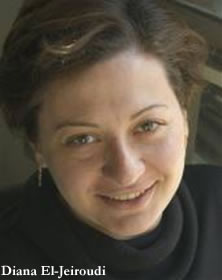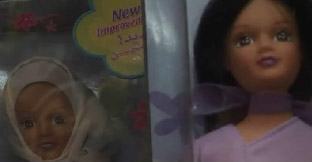 Born in Damascus in 1977, raised in Syria and Iraq, Diana El-Jeiroudi graduated from the University of Damascus with a degree in English literature. With a group of dynamic filmmakers, actors and producers, she started Proaction Films, the only independent film production outfit in Syria operating today, where she works in production. “Dolls” is her debut feature documentary, which is going to have its first public release later this year.
Born in Damascus in 1977, raised in Syria and Iraq, Diana El-Jeiroudi graduated from the University of Damascus with a degree in English literature. With a group of dynamic filmmakers, actors and producers, she started Proaction Films, the only independent film production outfit in Syria operating today, where she works in production. “Dolls” is her debut feature documentary, which is going to have its first public release later this year.
“Dolls” explores the phenomenon of the Fulla Doll that has become the dream of every Arab girl kid in the Middle East at the moment. Fulla is the veiled version of the famous American Barbie doll, which has lost its popularity as soon as Fulla entered the market. “She is Arabic, loving, caring and part of the community that she has been addressed to”, as its marketing manager mentions in the film.
the moment. Fulla is the veiled version of the famous American Barbie doll, which has lost its popularity as soon as Fulla entered the market. “She is Arabic, loving, caring and part of the community that she has been addressed to”, as its marketing manager mentions in the film.
Parallel with Fulla the doll, filmmaker focuses on “Manal”, a young mother and wife living in the traditional Syrian society with its conservative rules towards women. Manal and Fulla have much in common, they are wrapped in a scarf, trapped in a plastic box and have to follow others’ expectations.
With her first feature documentary “Dolls”, Diana El-Jeiroudi attempts to reveal a trend towards the commercial appropriation of a female model that limits the mind, sole and body of young generation, into one approved set of social and religious frame of choice.
 Shohreh Jandaghian – What was the motivation to choose this theme for your debut feature documentary?
Shohreh Jandaghian – What was the motivation to choose this theme for your debut feature documentary?
Diana El-Jeiroudi – I made my first short documentary in 2005 about the female identity and used the “Pregnancy” as a subject to try to illustrate how the female identity in our region is so much revolving around bringing children, hence was the name of the documentary “Al Qaroura” (The Pot). And later I came across the massive advertising and marketing of the doll “Fulla” which to me was just another framing to the female identity but was so much social but also a commercial-religious one. And it comes within a growing trend in Syria -and also the region- to go back to the cover but this time with a growing Islamic ideological approach as opposed to the original genuine traditions that evolve from inside the society. So together with a growing population rates, poverty, political and social pressures and the West focus against Islam, Fulla came as a commercial reflection on all of this for families. So I was immediately urged to observe and criticize, at least one feels participating in preventing a regional identity crisis.
society. So together with a growing population rates, poverty, political and social pressures and the West focus against Islam, Fulla came as a commercial reflection on all of this for families. So I was immediately urged to observe and criticize, at least one feels participating in preventing a regional identity crisis.
Shohreh – Fulla doll TV commercials and kids’ birthday celebrations with “Fulla birthday cake”, “Fulla Barbie dolls” and “accessories” remembers me starkly of the kids’ birthday party at Mac Donald fast food stations with Mac Donald’s gifts for children…  Diana – Fast-Food, or Fast-Identity!
Diana – Fast-Food, or Fast-Identity!
Both are using a brain-washing commercial propaganda that is receiving applauses from parents/adults. I feel bad for the kids who are addicted to ideas and concepts that will or at least might frame and limit their acceptance to the other and to the different once and for ever.
Shohreh – Does the protagonist of the film, Manal, see her daughter’s future like herself?
Diana – As far as I have observed, Manal wishes for her daughters a better future. But again “better” for her is wealthier, productive, and of course socially-approved and –limited prospects.
Shohreh – Being a woman filmmaker in a conservative society, do you confront particular difficulties to make your films?
Diana – As a woman documentary filmmaker, I wouldn’t say that I am facing difficulties, because society regards it a type of journalism which is at least an accepted work for women if you compare it with fiction and drama where people still regard it as an “art” and is associated with gender-mix and westernized, modernized lifestyles… However, on the other hand, being involved in women’ issues, I face a lot of conservatism and sometimes extreme resistance or rejection on behalf of people accepting to be filmed or exposed whether on the part of women themselves or the men of their families. But at the end this is part of the society inside which I do my research and films.
accepted work for women if you compare it with fiction and drama where people still regard it as an “art” and is associated with gender-mix and westernized, modernized lifestyles… However, on the other hand, being involved in women’ issues, I face a lot of conservatism and sometimes extreme resistance or rejection on behalf of people accepting to be filmed or exposed whether on the part of women themselves or the men of their families. But at the end this is part of the society inside which I do my research and films.
Shohreh – What were the major problems you had to overcome to make “Dolls”?
Diana – I had to start filming with one character, but later she refused to continue facing a lot of resistance of her family members (but not her husband). So again there was the society pressure. And later during filming with Manal I also had some difficulties in getting near certain subjects, or family members. Of course this will always be an issue that you have to respect because it can always be translated as “privacy”. And last but not least, NewBoy (the company than owns Fulla) and after seeing the trailer you saw, drew back from giving me access to further interviews and to filming inside their “kitchen” which was a huge lost for a part of what I wanted to show in the film. But again since I am not making a journalistic film about Fulla but rather using it as a metaphor in the documentary I had to come up with a new way of making the film and still talk about the same subjects and issues. So let’s call it training towards coming up with more creative means to make and show the same film.
 Shohreh – How did you go about getting funding for this film?
Shohreh – How did you go about getting funding for this film?
Diana – There is no film-fund in Syria at all. There is only the National Film Organization which is the governmental body for film and it has very little money that is at the end of the day and for almost the past 30 years is mostly allocated to their employed filmmakers, mostly in fiction and through a script censorship committee and rarely grant a co-production funding or financing. On the other hand, private sector for almost the past 30 years is only investing in and producing TV soap operas. So we always have to seek international funding and international financing. Thus comes the importance of funds like the Jan Vrijman Fund, which for us is our “local” fund.
Shohreh – How do you think Syrian audience will react to your film?
Diana – Film going in Syria is in a very bad condition. A lot of the film theaters show just Bollywood films, every now and then there is a block buster American movie or an equivalent of the commercial Egyptian ones. Syrian TVs show no documentaries not of any kind, so it is a disastrous state as documentaries are concerned. People watch some nature/history/politics TV documentaries every now and then on Al Jazeera documentary channel lately.
movie or an equivalent of the commercial Egyptian ones. Syrian TVs show no documentaries not of any kind, so it is a disastrous state as documentaries are concerned. People watch some nature/history/politics TV documentaries every now and then on Al Jazeera documentary channel lately.
If Dolls, was to be screened or broadcasted for the Syrian audience, I would expect different reactions actually, as different and divergent as the Syrian society is. But let’s talk about the Damascene audience (since the protagonist of the film is Damascene and so am I), I would think they will be more of less defensive because they would feel attacked of being indirectly female-oppressive (which they are), they will present condolences derived from religion to defend the general condition. But it is exactly why Fulla is present in the film. For me,  the film cannot stand by Fulla alone or with Manal alone, they have to come together, because it is only then when the society can comprehend their accusation for the female-conditions and see Fulla in a different context, which to me is the main issue. Fulla has to be seen within a social context. It cannot be only regarded as a wanted toy, it should be revealed as being a well-thought-off product that is the fruit or descendant of a society and also as a player in it.
the film cannot stand by Fulla alone or with Manal alone, they have to come together, because it is only then when the society can comprehend their accusation for the female-conditions and see Fulla in a different context, which to me is the main issue. Fulla has to be seen within a social context. It cannot be only regarded as a wanted toy, it should be revealed as being a well-thought-off product that is the fruit or descendant of a society and also as a player in it.
Shohreh – What do you do except film making?
Diana – I am a co-founder and producer in Proaction Film. And together with other independent filmmakers, we are organizing the first independent creative-documentary film event in Syria called DOX BOX that will take place for the first time in Damascus February 2008.
Shohreh – I wish you the best with your film and for DOX BOX!
